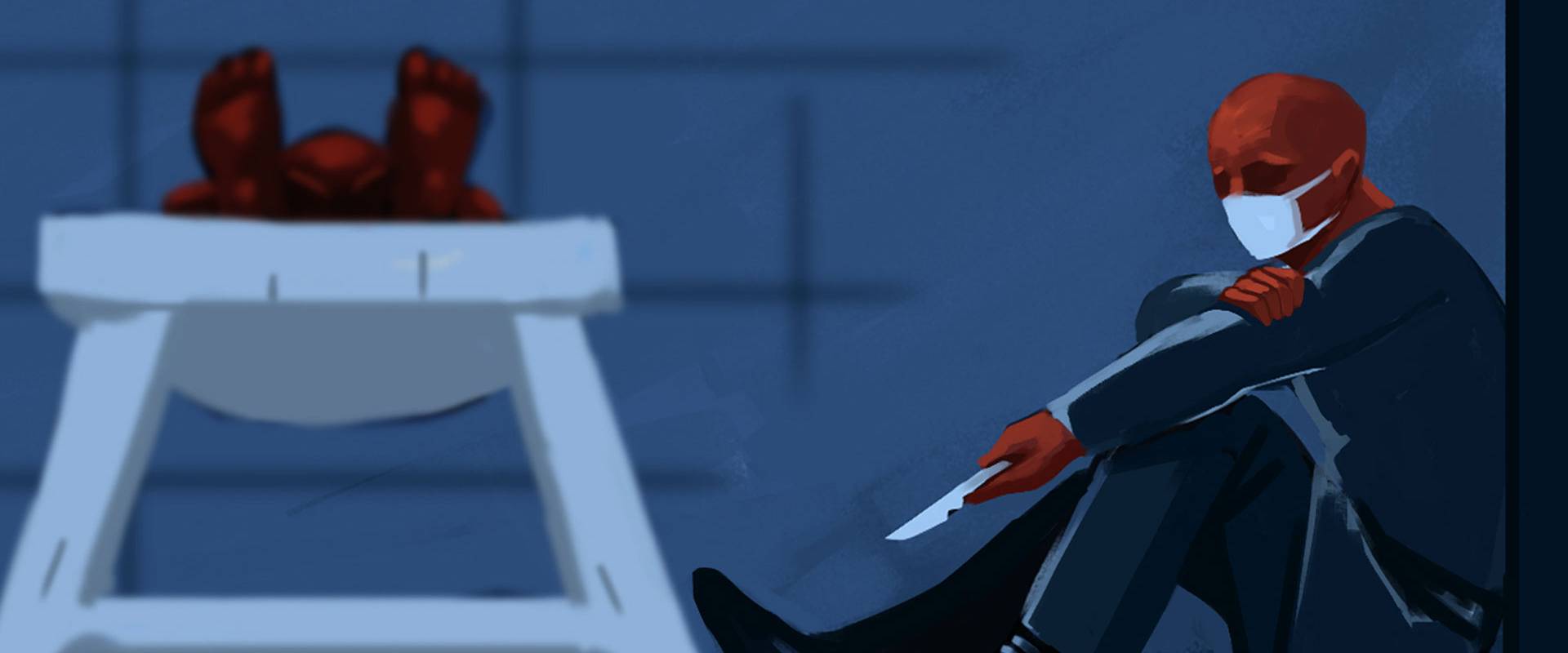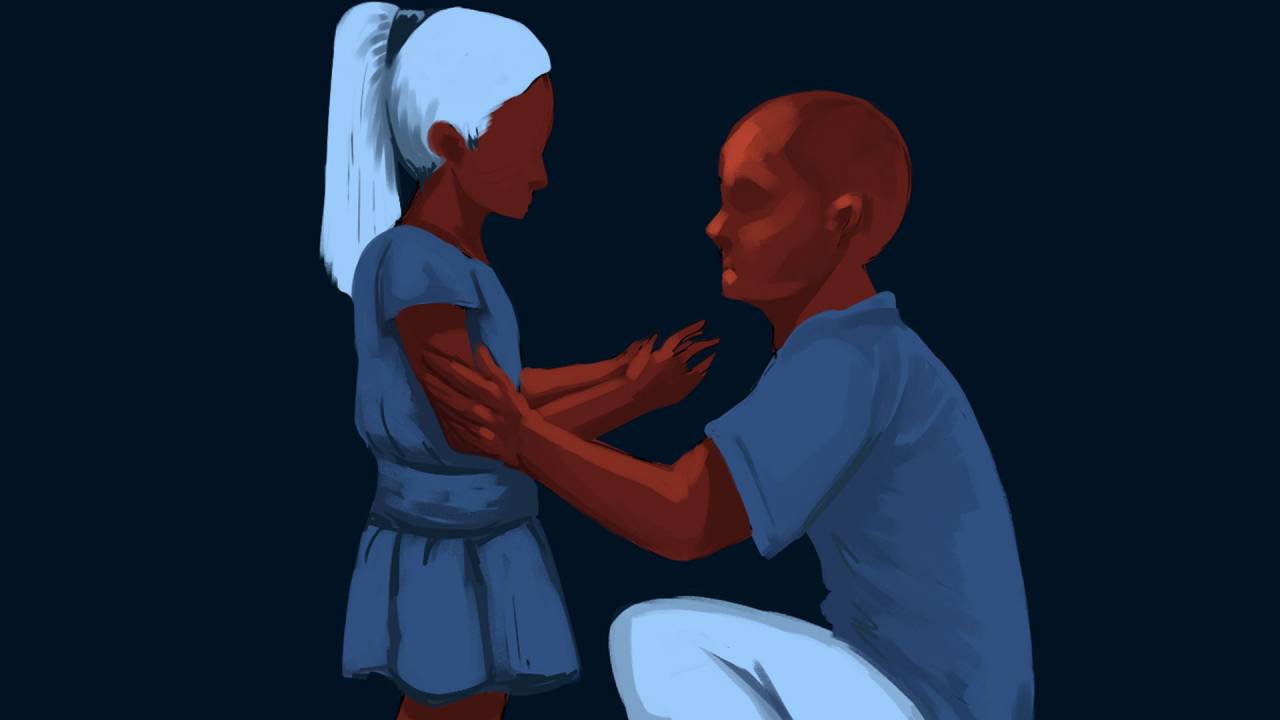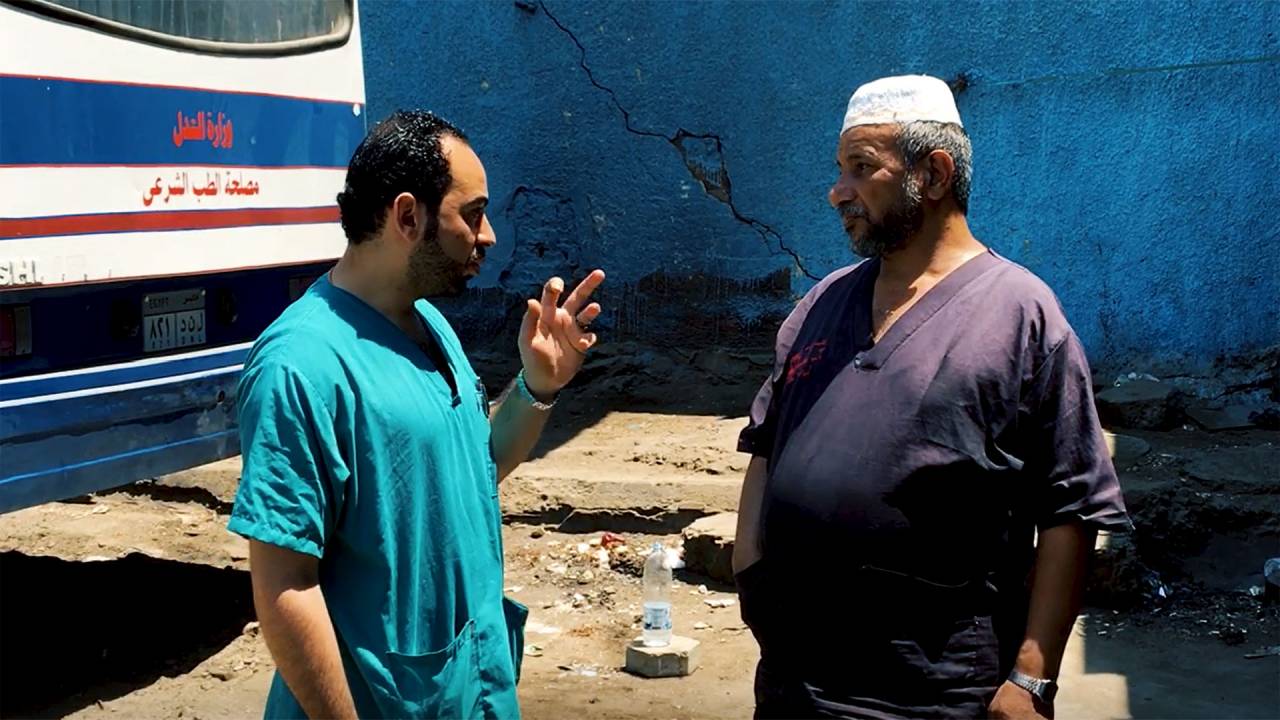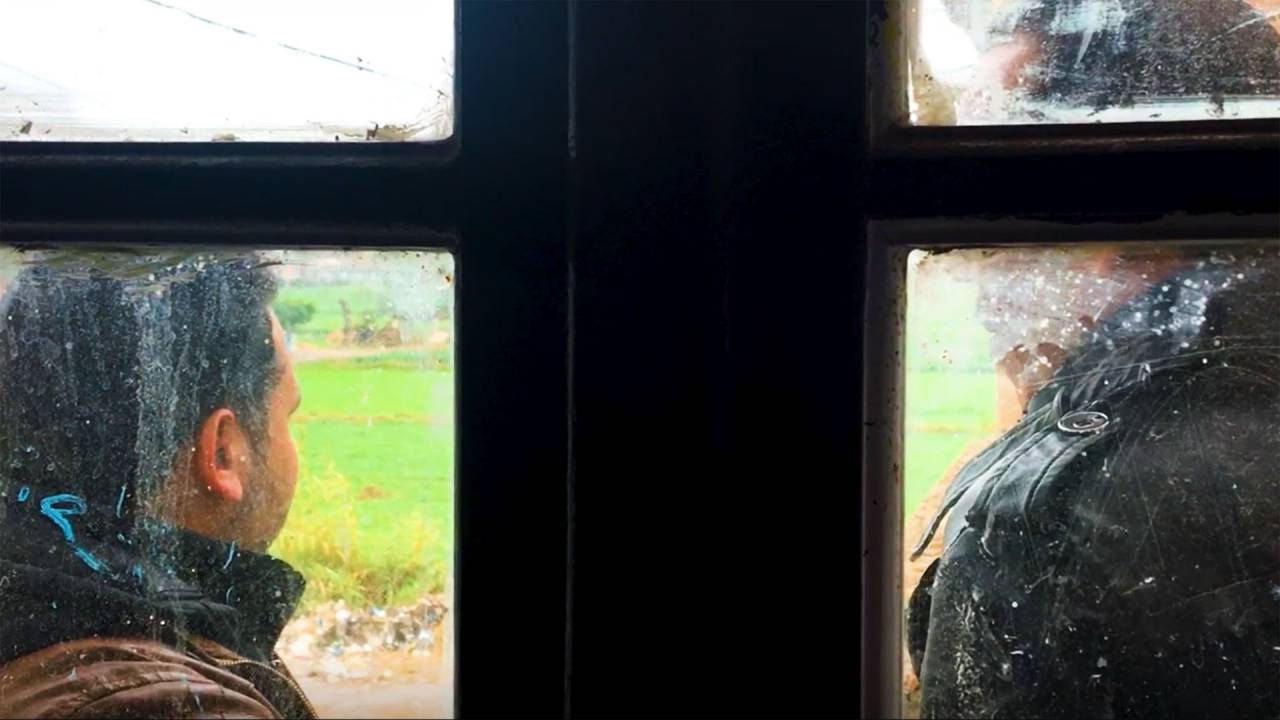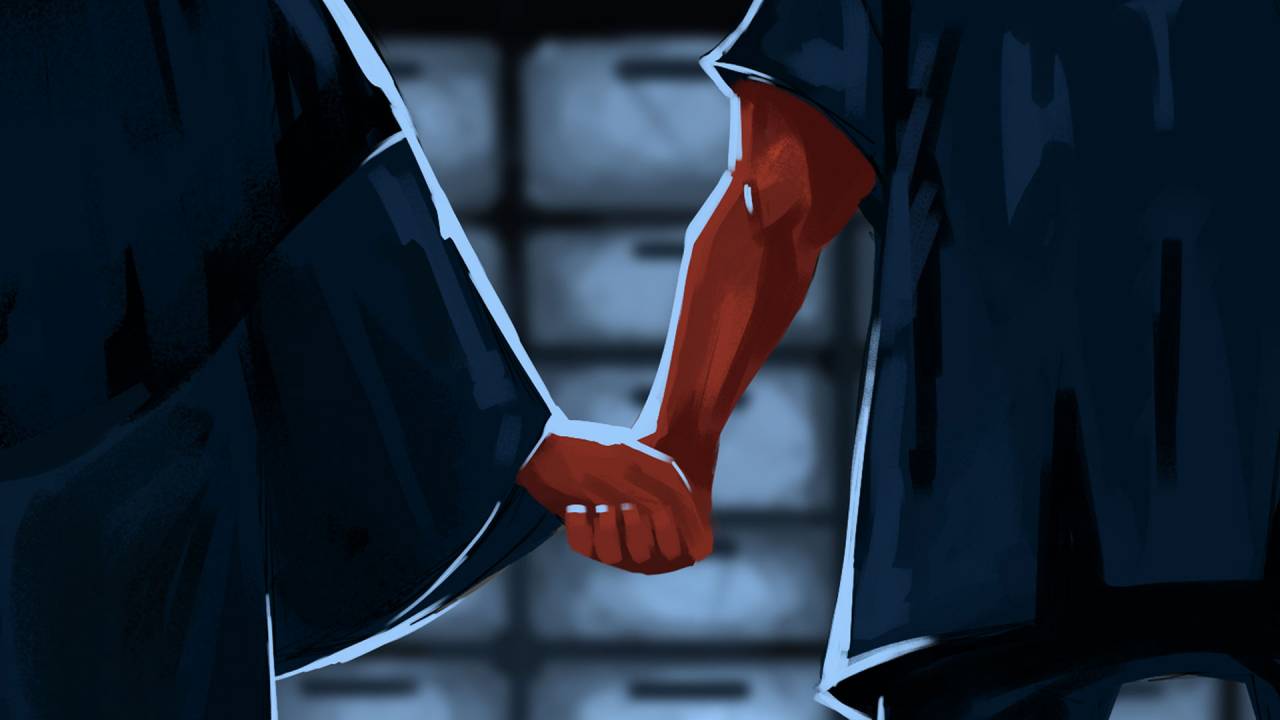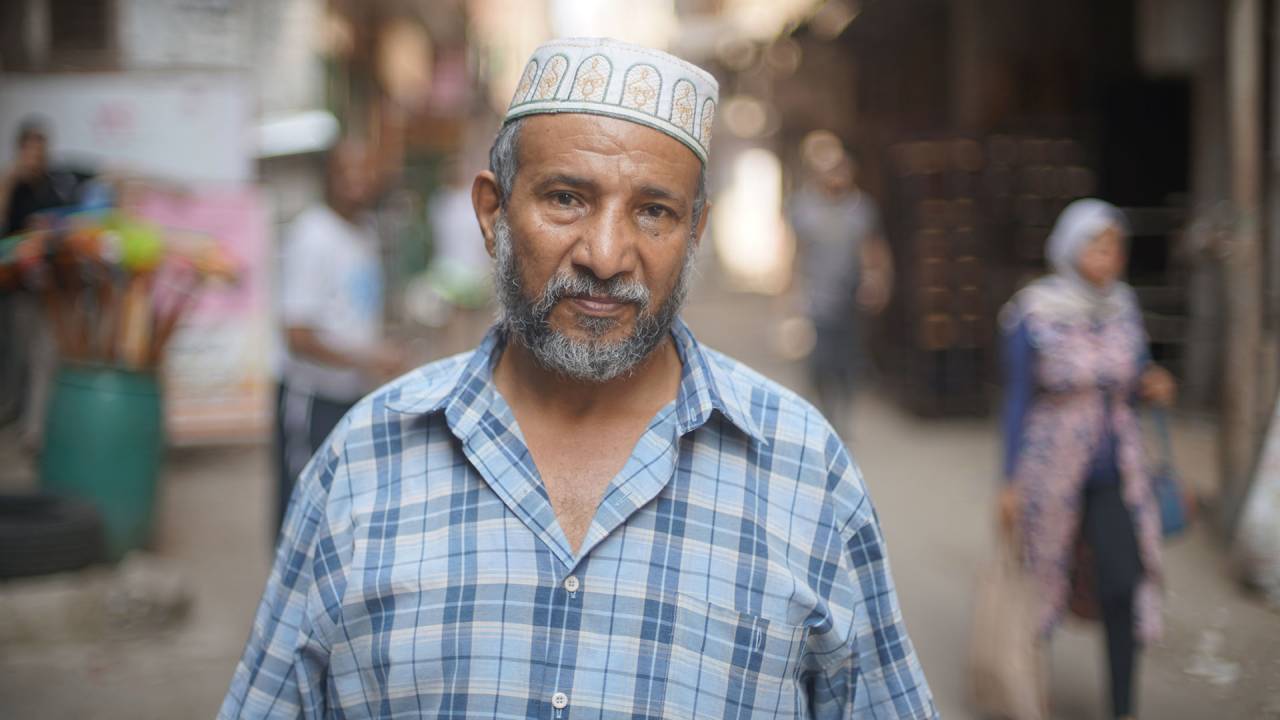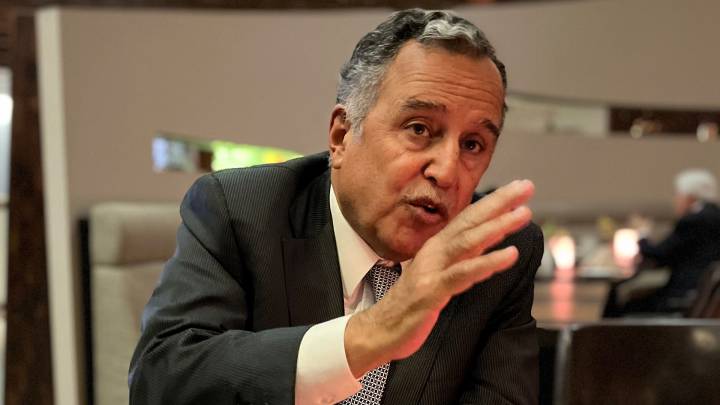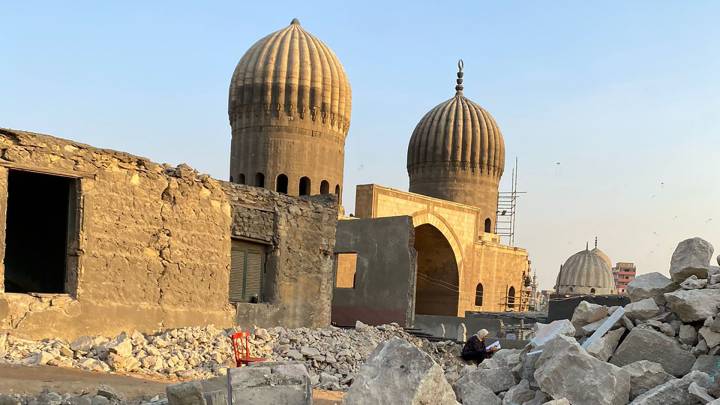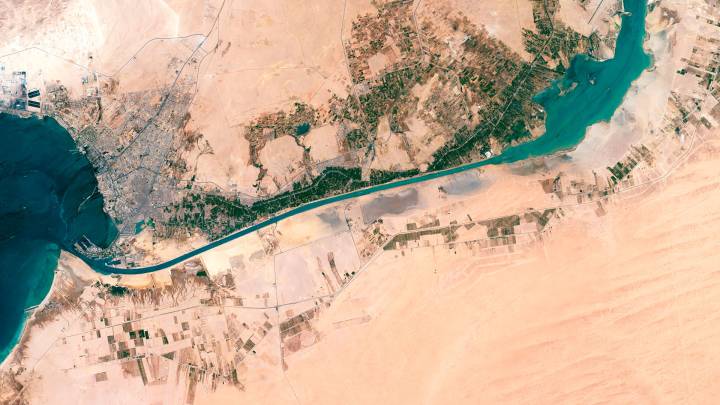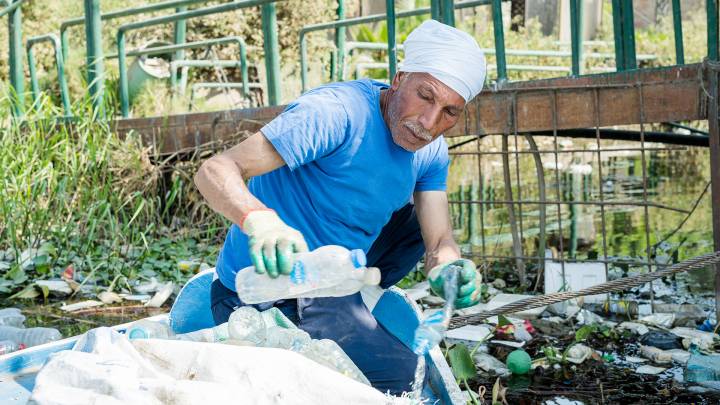The life of morgue workers in Egypt is not an easy one. But besides stigma, low salaries and numerous health risk some find fulfilment and even love at their unusual workplace.
Refrigerators are lined up next to one another, reeking of odours that make one gag. Pin-drop silence, shattered only by the sound of bone saws inside rooms with Quranic verses decorating their walls. This is the scene from inside the morgue, where the so-called “friends of the dead” live and work among corpses.
This investigation report includes audio and video testimonies from Egyptian morgue workers commonly known as diener, German for “servants”, including forensic doctors, autopsy technicians and other workers responsible for handling and cleaning corpses.
These people face stigma and social exclusion within their communities, and find themselves more often than not forced to hide the nature of their job even from their loved ones. This is not to mention the health hazards they are exposed to from the corpses, some of which are infected with serious diseases, and the lack of periodic monitoring, safety and prevention measures.
“One of the most difficult moments of my life was when my daughter saw my name in a newspaper and found out about the nature of my work at the morgue,” says Youssef Mohammad, who asks for his real name not to be mentioned. “She was shocked. She asked me, ‘Why are you doing this? What kind of a job is that?’”
The words of the 13-year-old were like a slap in the face for her father, an autopsy technician at the Justice Ministry’s Zeinhom morgue, south of Cairo.
“This is a good profession and serves a purpose. When you grow up and become a doctor, you will understand the goal behind what I do. We are not mere butchers, cutting off bones of human corpses, as people view us. We try to get to the bottom of things, and bring justice to people who can no longer speak for themselves to reveal the truth,” Mohammad told her, trying desperately to explain the nature and reasons of his job.
“They see us as butchers”
It took the teenager a while to be able to stomach the news, and she still dreaded going to school, as she did not want her schoolmates asking her questions about what her father did for a living. This prompted him, still in his thirties, to consider quitting.
“I thought of going back to university and obtaining another degree to be able to get employed somewhere else. I did not want my family to get harassed because of what I did for a living,” he says. “I fear for my family. I am also anxious from having to hide the nature of my job from people all the time. They see us as butchers.”
Whenever he visits a government institution, Mohammad tries not to show his identity card, which bears his profession. “Every time I had to display my ID while entering a government department, some would look at me as if I was Azazel, the angel of death.”
He had problems not only with strangers, but also with people close to him.
“No one knew the nature of my job except for my mother, siblings and very close friends. I had to hide it from my wife. When she found out about it, she was really anxious. It took her a while to come around to the idea,” he says.
Mohammad spends most of his days around three mortuary refrigerators. “At the beginning, it was difficult for me to realise that I practically live, eat and sleep with dead people. I smell the stench of death. It was unbearable. But later I learned to really love what I do. It was a good thing for me that the majority of my friends and acquaintances did not know what my job was. Some shunned me the moment they learned about it, as if I were an alien or a disgusting person.”
Mohammad has found refuge from the daily harassment in solitude, preferring the dead to the living. He often wonders why people continue to avoid him. “It is not like I am doing something wrong, or I am a thief or a murderer.” To make ends meet he has tried to find an additional job, but to no avail. No one will hire him, because he is an autopsy technician.
“What keeps me awake at night is the inevitable moment when a man will come to ask for the hand of my daughter in marriage. His family will obviously want to know what his future father-in-law does for a living. Will they turn my daughter down over this? How could I possibly be the reason for her heartbreak?” Mohammad laments.
Laws dating back to King Farouk govern the work of forensic doctors
Dr Dina Shukri, a professor of forensic medicine and head of the Arab Union of Forensics & Toxicology (AUFT), says, “Society’s perception of forensic doctors, that they merely deal with corpses and perform autopsies, is inaccurate.” She explains that 85% of forensic workers deal with people to have them sign documents related to legal cases on sexual assault, harassment or allegations of sexual crimes, and stresses that viewing work at a morgue or in forensics as mutilation of the dead is “unacceptable”.
Society’s negative perception of the forensic autopsy has caused a lack of staff in this field in some Arab countries, prompting them to hire Egyptian forensic doctors and pay them high salaries, given their extensive expertise. Shukri notes that a “very small” number of forensic doctors cover all the nation’s governorates. “Forensic medicine departments in universities are fully fledged but doctors work only in consultancy jobs,” she explains.
In addition to the shortage of forensic doctors in Egypt, there has been no reform to update and revamp the legal framework for forensic medicine, other than intermittent attempts by the relevant officials. Dr Ayman Fouda, who was Head of the Egyptian Forensic Medicine Authority (EFMA) from 2005 until 2007, explains that EFMA employees are subject to decree-law no. 96 of 1952 regarding [occupational] licensing and regulations before judicial authorities. This royal decree issued by King Farouk continues to govern the work of forensic doctors. Despite attempts to amend and update it, the law remains archaic and outdated.
Fouda, however, tried to limit the increasing emigration of forensic doctors during his term in office, setting a six-year limit on staff secondments abroad. “Should forensic doctors want to prolong the secondment period, they had to either resign [from their original position in Egypt] or return home,” he explains.
Amani Abdel Hakim was among those who left the country. She spent two years in Saudi Arabia, working as an assistant professor at the College of Forensic Sciences at the Naif Arab University for Security Sciences (NAUSS). She returned to Egypt in 2019 to teach in several universities.
“Forensic doctors leave Egypt mainly in search of better financial offers. They are usually offered salaries that are 10 times higher than what they get at home, in addition to the modern equipment they can find in other countries. They also do not work the same number of extensive shifts, not to mention having to go on secondment to other countries due to shortage of staff,” she explains.
Commenting on the difference in salary, Abdel Hakim says, “During my work with the EFMA I used to be paid about 16,000 Egyptian pounds ($1,000) a month, which included 2,800 pounds ($178) in salary breakdown, 8,800 ($560) in incentives, and between 1,200 ($76) and 1,250 ($79) in allowances for late-night shifts, depending on the day of the month. This is in addition to between 1,800 pounds ($114) and 2,000 pounds ($127) for field work, as well as 1,400 pounds ($89) from one of the funds, which varied from month to month according to the income.”
“Meanwhile, a forensic doctor in Saudi Arabia is paid 14,500 Saudi riyals ($3,865), in addition to a three-month housing allowance amounting to 24,000 riyals ($6,398), 500 riyals ($133) for giving a lecture, 1,500 ($400) for a speech at a conference, and 500 riyals ($133) as an annual bonus.”
She continues: “If we look at the salary ranges for doctors in the US, for instance, we find that psychiatrists, forensic doctors and dentists hold the highest salaries. They are classified among the highest-paying jobs in the country.”
“In the morgue you see the people for who they truly are”
“Forensic medicine is classified into four fields: forensic pathology, involving medicine and surgery graduates; forensic biology and laboratories, also involving medicine and surgery graduates; forensic chemistry and toxicology, which deals with substance and drug analysis and investigation, and involves biology, chemistry and pharmacy graduates; and the counterfeit and forgery department, which includes experts in investigating documents, currencies and electronic cases,” she explains.
In Egypt, there are currently 24 forensic pathology departments, two forensic biology laboratories, seven forensic chemistry and toxicology laboratories, and ten counterfeit and forgery departments.
Hisham Mahmoud Farag, an autopsy technician at the Zeinhom morgue, faces the same hardships and stigma because of his work.
“People think we are heartless butchers. Some of my closest friends make fun of my work, saying that I am a slayer and a killer. But I don’t really care, as I love my job and I am proud of what I do. This is who we are. We live lives hiding behind the sun,” he says.
Farag recalls the first time he stepped inside the morgue six years ago. He stood there examining the faces of the staff, staring with awe at the mortuary refrigerators and the blood splattered all over the place. He took special interest in the work of the forensic doctor, paying attention to the slightest detail in his work.
Being inside such a grim and gloomy place would have been intimidating for almost anyone else, but not to this young man in his thirties. Farag felt great awe for the work done there and knew at once he wanted to be part of it. “I love the morgue. The dead are calm and I do not fear them. There, you see the people for who they truly are.”
When he first told his father about his desire to work at the morgue, he was against the idea, even though he himself was an EFMA radiology technician. Farag dug in his heels and stood his ground, applying as soon as the job openings were announced, much to his father’s dismay. He passed all the hiring procedures and found himself in a new world, that of the dead.
The first few days were difficult, with the awful stench of death lingering. He lost his appetite at first, but over time gradually adapted.
Farag’s daily work around cadavers has not stripped him of a sense of sympathy whenever he looks at the small bodies of young children inside the refrigerators. “Until this day, I cannot stop thinking of the corpse of the little girl who died in the al-Warraq church explosion. She was wearing a white bridal gown and a pair of new sandals. When I received her tiny body, I cried my heart out. What was her fault to deserve such death? She was an innocent angel,” he says bitterly.
“Death was haunting me everywhere I went”
Social stigma is not the only hardship facing morgue workers. Some are subjected to serious threats to their lives, and others contract dangerous diseases.
On March 13, 2016, Kamal Mustafa – who request a pseudonym for this report – headed out to his workplace at the morgue to prepare the necessary equipment and tools to assist the forensic doctor on an autopsy. He did not feel well – he was extremely tired and had difficulty breathing, as had been the case for a while. His colleagues urged him to see a doctor.
The lanky thirty-something thought he was experiencing temporary symptoms that would soon go away. But they did not. Medical exams revealed that he had contracted tuberculosis (TB). In his two-storey house in a town in the Beheira coastal governorate, where he lives with his wife and four children, Mustafa is reluctant to speak about his experience, doing so only on condition of anonymity.
“I had worked as a security guard for two years in the UAE. When I returned home, I was looking for a job and came across a vacancy in forensics at the morgue. This kind of job is not in high demand, and few people applied. I have a background in forensic medicine from my siblings who work in the field in the UAE. I applied and landed the job. I liked it,” he says.
Mustafa started out as an autopsy technician, but within a few months his health had completely deteriorated.
“I first had TB. Then I was diagnosed with rheumatoid arthritis [a chronic inflammatory disorder affecting the joints]. I had to undergo a paracentesis procedure. I was taking injections to treat the arthritis and I was not supposed to have them for long; while they alleviated my pain, they also made me drowsy. I could not take them for long, otherwise I would not have been able to go to work.”
Mustafa adds that all the medical tests he took prior to taking up his position, from October 2011 until he was appointed in 2012, showed that he was “fit and healthy” to carry out the required tasks.
“One of the hardest moments I have had to endure was when my doctor requested that my wife and children get tested for TB, to ensure they were not affected. Fortunately, their results were negative,” he says. “I really went through a very difficult time. I had to take 23 pills in the morning two hours before breakfast for six months, which is equal to 180 days of torment. I took a lot of unpaid leave from work, and underwent surgery. The illnesses I suffered would cause any man to collapse. Some of the health insurance doctors offered to give me medical reports so I could work fewer hours, but I could not afford to lose my job.”
His wife tried to talk him into quitting, especially with his poor health condition and low salary. He refused. “Death was haunting me everywhere I went. The world had become too dark for me.”
Making matters worse for Mustafa, his son had been born with a hole in his heart, which required him to visit doctors and hospitals regularly. The medical costs for both him and his son took a heavy toll on Mustafa, whose financial situation was already dire.
He talks about the differences in the security and prevention measures between his workplace and that of his two brothers in the same line of work in the UAE. “My two brothers sent me a protective suit, which they told me they replace for every autopsy, for maximum protection. I, on the other hand, wear mine for long periods. Also, there is a huge difference in the equipment and autopsy tools such as bone saws.”
Mustafa continues to face a grim future. He never imagined that the career he wanted would become life-threatening for him.
“Some workers used to buy supplies at their own expense”
Amgad al-Haddad, Head of the Allergy and Immunology Department at the Egyptian Institute for Vaccine and Serum (VACSERA), confirms that there is no chance of an infection being transmitted from a dead body to a living person, as long as preventive measures are taken during work.
“Diseases cannot be transmitted from a dead person by breathing, since no particles carrying the diseases are emitted,” he explains, citing the novel Covid-19 virus, which cannot be transmitted from the dead to the living. “The virus needs a living cell to proliferate.”
Haddad’s statements are in line with the World Health Organisation (WHO) March 24 interim guidance on safe infection prevention and control for the safe management of a dead body in the coronavirus context. “Except in cases of hemorrhagic fevers (such as Ebola, Marburg) and cholera, dead bodies are generally not infectious. Only the lungs of patients with pandemic influenza, if handled improperly during an autopsy, can be infectious. Otherwise, cadavers do not transmit disease,” the WHO publication reads.
The WHO also stresses that the safety and well-being of anyone tending to bodies should be the priority, and that before handling a corpse, people should ensure that the necessary hand hygiene and personal protective equipment supplies are available, including gloves and a protective suit.
“The EFMA budget was low in past periods. We were sending 12 pairs of gloves to the forensic department, where there were 50 bodies. Double gloving is highly recommended for workers handling autopsies, but this was not the case, as there was a shortage of equipment. Some workers used to buy supplies at their own expense. Things are much better now,” a former EFMA official says on condition of anonymity.
Mohammed Ismail, who’s name has been changed as he requested anonymity, is going through the same hardships as his colleague Kamal Mustafa. He was shocked to accidentally find out that a dead person he handled as he assisted the forensic doctor on an autopsy had died of AIDS. The news wreaked havoc on his psyche.
“Imagine handling a cadaver and sawing its bones with blood spraying from the dead heart at you, only to discover later that the body has AIDS. I am extremely anxious. I want to get tested, but I am afraid of the result. What we are going through every day is torment, as we never know what we are dealing with when dissecting a corpse, and what diseases may be inside,” he says.
Ismail needed to be reassured and put an end to his anxiety. He wanted to undergo a comprehensive medical examination, which costs 1,000 pounds ($63), but could not afford it, so just took hepatitis B and C tests and a blood viscosity test. He says that since he started work, EFMA officials have never requested that he undergo any medical examinations as regular preventive measures.
Some EFMA workers have filed lawsuits
Meanwhile, Dr Mohammed Sidqi, a professor and Head of the Department of Chest Diseases at Al-Azhar University’s Faculty of Medicine, says AIDS is only transmitted through blood or physical contact, and that there is no chance of AIDS being transmitted from a dead body to a living person.
Sidqi’s statements are in line with those of Dr Dina Shukri, who also believes that the chances of being infected by a corpse are low. However, she explains that if a worker gets a cut while performing an autopsy and thus has an open wound, he risks getting infected. Therefore, all preventive measures must be strictly followed during the autopsy process.
An EFMA official who prefers not to be named rejects allegations that officials at the authority have been evading their responsibilities to this effect. He explains that the Health and Social Services Fund of the Egyptian Ministry of Justice bears all costs of treatment for sick workers, but has a spending ceiling.
Ismail’s accounts seem to be consistent with the views of Dr Ayman Fouda, who stresses that autopsy carries high risks, with a high chance of diseases being transmitted from the dead person to the forensic doctor or autopsy technician in the event of an accidental cut or wound. Some EFMA workers have been infected with hepatitis C and other respiratory illnesses as a result of inhaling chemical fumes, and have filed lawsuits in this regard.
Fouda believes that a law must be enacted to protect forensic doctors and offer them salaries that are commensurate with the risks they face at work, in addition to providing the necessary medical protection, since they are prone to infections and hazardous incidents. He adds that there should be more scholarships for this field and an increase in the infectious disease allowance.
On March 16, the Egyptian Medical Syndicate (EMS) called on Egyptian President Abdel Fattah al-Sisi to increase the infectious disease allowance, noting that the current allowance ranges between 19 pounds ($1.21) and 30 pounds ($1.90) per month only. This has been the case for the past 25 years, with no increase whatsoever.
Dr Amani Abdel Hakim says that several workers at the pathology forensic department have been diagnosed with lung cancer, and some have died as a result of inhaling formalin and constant exposure to toxic fumes.
“Many workers were very sick because of having inhaled toxic fumes, yet they showed up to work every day. Otherwise, we [the EFMA] would have had to force them into early retirement and they would have lost most of the value of their salaries. So I figured that I would deal with the situation from a humanitarian point of view, and allow them to come to work but to rest for as long they needed,” she says.
She adds that doctors submitted several complaints to the EFMA head at the time, Dr Hisham Abdel Hamid, regarding formalin. He issued instructions that doctors at the forensic pathology department must open formalin samples in the morgue and not the laboratories, since the morgue had more space.
Inhaling formalin was not the only problem, according to Abdel Hakim: “The central forensic medical laboratories were receiving scores of dead bodies from across the nation, which of course carried various forms of bacteria and viruses.”
Abdel Hakim adds that she has been trying to find solutions and alternatives to protect doctors, and has been successful in stopping the use of benzidine, used in the analysis of blood samples, as it has been found that long-term occupational exposure to benzidine can cause cancer.
Love in a seemingly unlikely place
The social stigma attached to morgue workers, often viewed as heartless butchers, did not stop a love story from unfolding next to mortuary refrigerators – that of Sheikh Saeed, the oldest corpse washer at Zeinhom morgue, and Saadia al-Sayed, who used to assist him.
47 years ago, young Saeed had to drop out of middle school to work as a house painter with his father, so that his destitute family could make ends meet. He did this for 23 years before joining the Zeinhom morgue as a washer, his job for the following 24 years.
Saeed, 62, and Saadia met 15 years ago. She was a neighbour in the working-class Imbaba area in the Giza governorate, and asked him to help her land a job inside the morgue so that she could assist him and be rewarded for washing the deceased, based on the Islamic concept that those who wash dead people will be rewarded by God. He agreed, and they had worked side by side for a long time.
Their love story flourished within the walls and the refrigerators of the morgue, until one day Saeed proposed to Saadia and she said yes.
They live in a modest ground-floor Imbaba apartment. Sheikh Saeed is the chief washer at the Zeinhom morgue – “the friend of the corpses”, as his friends like to call him. They have two sons and two daughters, and 13 grandchildren living nearby.
Saeed has spent half of his life inside the morgue washing corpses, away from the hustle and bustle of daily life. He takes pride in what he does and speaks about it to his children, grandchildren and friends. He believes what he does will be “rewarded by God”.
The white-bearded old man, donning a hat, heads to work early in the morning every day to wash the dead with the help of his aides. He spends most of his day in one room, adjacent to the morgue. He returns home late in the day to spend time with his wife and grandchildren.
Saeed vividly remembers the Port Said Stadium riot [when 74 people were killed]. “I will never forget the day I washed the bodies of the young men of Ultras Ahlawy Club. One moment they were wearing their red T-shirts, the next they were clad in white shrouds. I cried my heart out,” he laments. “This incident wreaked havoc on me. Many were surprised to see me sob the way I did, as they believed I was used to the sight of dead people.”
Saadia, who spent 15 years of her life inside the morgue, used to help her husband in washing the bodies of women, until one day her eyes were damaged during a quarrel between neighbourhood residents and she had to stop going.
Like her husband, she believes her work will be rewarded by God, and is not ashamed of it. On the contrary, she is proud. “I love the morgue and I take pride in my work. If I had to do it all over again, I would still choose the morgue,” she says.
One difficult moment for her was when she had to wash the body of a young woman who had burned to death on her wedding day. “I received the body of a young bride who was burned. The henna was still on her hands. This broke my heart into pieces.”
“I do not care about what people say about us, that we are heartless. I sobbed and cried when I washed the tiny bodies of children. My tears would uncontrollably trickle down my face. I once had to handle the bodies of a mother and her infant whose corpses were glued together as a result of a fire. This took a great toll on my psyche.”
All these so-called friends of the dead continue to hope that one day society’s view of them will change and they will be treated as normal workers worthy of respect, not as heartless butchers.
Youssef and Hisham continue to suffer from social stigma. Kamal is still bedridden because of his illness. Ismail fears taking the medical tests to find out if he has contracted AIDS. Saeed and Saadia live a quiet life with their grandchildren, having come to terms with and appreciating what they do for a living.
The names Youssef Mohammed, Kamal Mustafa and Mohammed Ismail are pseudonyms, on the interviewees’ request. The research for this article was supported by the Candid Foundation’s journalism grant.
